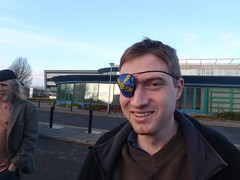At the end of November I was misfortunate enough to end up with severe traumatic head trauma and double vision. After 2.5 months the signs are good for a recovery.
Severe traumatic head injury is when you get a nasty shock to the head and end up in a coma for 1 day to 2 weeks (I was out for 3 days). Waking up from a coma is not like in films, I had two days in a delirium gradually realising I wasn’t dreaming and something was up. My nice flatmate and dad came and rescued me from that.
Back in Scotland the NHS (remember it’s independent here, no playing around with it as David Cameron is doing in England) gave me an MRI scan to check my brain had no dead patches in it, fortunately there were not.
However there are no magic drugs for brain trauma, a lot of neurons need to get rebuilt so it just needs a long slow recovery. My cognitive abilities have been improving nicely week by week. I used to be tired at just thinking about something brain intensive like programming, now I can manage it pretty well. My context switching ability (which allows for multi-tasking) was initially very slow but is now much better. My concious spelling (when you are thinking about spelling not just writing it without thinking) did not work at all but is now coming back.
I get tired easily, as with any illness your body needs to force you to rest more. Initially I went to bed early each night, now I don’t feel the need so much. Good manners take more energy too so I get grumpy and snappy after a day spent organising people or when I’ve been in the cold for too long.
The other part of my illness is a stretched muscle in my eye giving me double vision. This too has no miracle cures and just needs a long slow recovery. I have one lense of my glasses taped over which prevents double vision. But since I don’t use glasses much and they cause a bit of strain on my eyes when used with a computer I bought an eye patch. You can not buy decent eye patches in Europe as far as I can tell, only cheap ones which aren’t comfortable to wear for several months at a time. So I had to get one from an american medaeval recreation costume company.
The eye patch is the most obvious sign I have a (presumably temporary) disability. Most people have never come across such a medical issue before and so act in one of the following options: ignore it and forever wonder why I’m dressed like a pirate, ask politely why I’m dressed like a pirate, joke and go yarr. Even the neurology doctor I went to see had the “nice pirate costume” reaction. This is all fine and perfectly understandable. Only drunk people grate because they can not moderate their tone of voice to make it friendly enough. If you ever see a disabled person when drunk, just stay quiet.
The most curious reaction I’ve had was “I wouldn’t treat you like a disabled person.” What this means is “I wouldn’t treat you like a wheelchair user” and shows a lack of understanding of limited ability/disability which means so much more than wheelchair users. When you meet a disabled person do not modify your language or act self-conscious, just modify your actions as you work out their abilities. If in doubt ask politely.
Only being able to use one eye at a time means I have no depth perception. Out goes canoe polo games since I can’t catch or throw at all reliably. Also stairs feel very dangerous, especially those without handrails. Most stairs in the UK have handrails because of the great disability legislation we have here. In Belgium by contrast they do not and they consider it acceptable to close off disabled toilets with signs pointing at the less-accessible toilets.
Keeping up top psychosomatic health is important during a long recovery. This means the relationship between good body health and good mental health. My good friend Beth came up and helped me do a deep clean (“spring clean”) of the flat, good housing has a very strong relationship to good health. She also cooked lots of chilie bean mix and put it in lots of bags in the freezer, this is a nice easy way to get back into cooking (which I had to stop doing because of lack of energy), add a bag, add some carbohydrate and boil away. Lovely.
I’ve also been taking alexander lessons from my mum, this is nice and relaxing but also helps with long term posture which I find it hard to keep right when I’m low on energy. And Eddy the canoeist has been using me as a test run for his massage course which works out nicely. Psychosematic health is also helped by a placaebo which feels like real medicine as long as you choose to believe so I’ve been taking homeopathic pills.
Thanks to everyone who has been helping!

